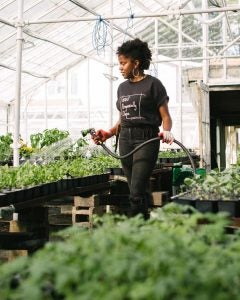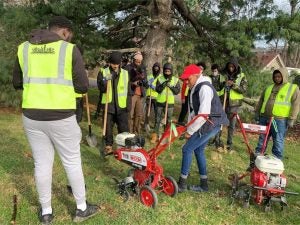When celebrating Women’s History Month, we often focus on the amazing work of women in the past. But for this March, I thought deeply about women making history today and working to create a better future. One of those amazing women is Christa Barfield, founder of FarmerJawn.
“Jawn is a Philly word meaning person, place, or thing,” Barfield states. This colloquial term is popular in Philadelphia’s urban and historically Black communities and refers to anything and everything. Barfield says, when paired with Farmer, FarmerJawn empowers her community to know that anyone can farm, and everyone deserves to know where their food comes from.
This idea is personal to Barfield.
In 2018, after working in healthcare administration, Barfield resigned from her job with no concrete plans about what was next for her. Soon after, she took her first trip out of the country to the Caribbean island of Martinique. There, she witnessed how intentionally people integrated agriculture into their lifestyle. From the Thai chef who served her tea using handpicked herbs from their garden to the Black farmers who served as her Airbnb hosts, she witnessed the transformative power of agriculture. She also saw the gap in Black people farming in her community.

Barfield speaks of the lost history of agriculture for her community and the importance of reviving that.
“For me, it’s about being a representation that you matter and talking about why farming is even a point of contention for Black people in America,” she said. “Slavery and mass incarceration extended within agriculture and farming. When people fled to the north during the Great Migration, we left some of those skills and stories behind. It’s important to reclaim who we are, our heritage and history, and what we can become.”
It was through this intention that FarmerJawn was born. Barfield announced her first CSA (community supported agriculture) launch in January 2020, and since then, her vision has grown tremendously. Currently, FarmerJawn operates 4,000 square feet of greenhouse space on five acres of land. This land will support nano farms to grow produce that will be used to sell products at a new type of corner store.
“Having access to a farmer is hugely important beyond just food access.” Barfield said. She notes the importance of being able to know and connect with the people to produce your food. It adds to her model of personal, social, and environmental health. “All three have a symbiotic relationship that urban agriculture can affect.”

These innovative and vital components of FarmerJawn’s work continue to expand. On Earth Day Weekend, FarmerJawn will be launching its urban garden center FarmerJawn Greenery. It will provide the supplies people need to grow food at home. In 2023, FarmerJawn plans to accept applications for its Urban Agriculture School to help aspiring farmers develop their business plans and gain skills to expand urban agriculture across the country. All together, FarmerJawn will impact communities in Philadelphia and beyond affected by food insecurity, gentrification, and health inequities.
Barfield had the opportunity to share the work of FarmerJawn this month on Good Day Philadelphia for the city’s local Fox affiliate. She says that being able to share this work and prove the impact FarmerJawn is having in the city is helping us to change the face of farming and agriculture (find FarmerJawn on Facebook and Instagram).
“I was raised by my mother to always come correctly — how to dress and carry yourself in public as a representative of our family,” Barfield explained. “Agriculture is a very Anglo-Saxon, male-dominant occupation. The face of it is certainly changing. I am happy to shock people when they see that I can show up differently from what they expect.”

From being in a suit in one minute to working clothes in the next, Barfield says people can appreciate that contrast when people see that farming can be more diverse. These are crucial steps to making the food and agriculture industry more equitable.
Barfield’s words were simple when asked what advice she would give to anybody looking to pursue a path.
“Believe in yourself and keep it all moving,” she said.
Barfield and the work of FarmerJawn Agriculture demonstrate the monumental work of women in the agriculture industry. History is not only what is done it in the past. Making history means creating a better future for the world.
Irene Lewis is a recent Master’s student in the John Glenn College of Public Affairs at The Ohio State University with a major in public administration with a focus on public policy and management. She is a south Louisiana native and food justice and access advocate.




